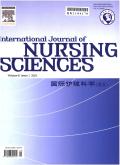Associations between depression, resilience, and fatigue in patients with multivessel coronary disease: A cross-lag study
IF 3.1
3区 医学
Q1 NURSING
引用次数: 0
Abstract
Objectives
This study aimed to examine the associations between depression, resilience, and fatigue in patients with multivessel coronary disease and verify their causal relationships.
Methods
Between October 2023 and June 2024, 316 patients with multivessel coronary disease were recruited from three tertiary hospitals in Tangshan, China. The Patient Health Questionnaire, Connor-Davidson Resilience Scale, and the Multidimensional Fatigue Inventory were administered to the patients on the third day of admission (T1), one month after discharge (T2), and three months after discharge (T3). Pearson correlation analysis was conducted to examine the relationships among depression, resilience, and fatigue in patients with multivessel coronary disease, and cross-lagged analysis to explore the temporal causal relationships.
Results
In patients with multivessel coronary disease, levels of depression and fatigue decreased from T1 to T3, while resilience scores increased during the same period. The correlation analysis revealed significant relationships among depression, resilience, and fatigue at T1, T2, and T3 (P < 0.01). The autoregressive paths indicated high stability over time for depression, medium stability for resilience, and low stability for fatigue. Cross-lagged paths demonstrated that depression at T1 significantly predicted fatigue at T2 (β = 0.461, P < 0.001), and depression at T2 significantly predicted fatigue at T3 (β = 0.957, P < 0.001). And resilience at T1 significantly predicted fatigue at T2 (β = −0.271, P < 0.001), and resilience at T2 significantly predicted fatigue at T3 (β = −0.176, P < 0.001). Additionally, resilience had a moderating effect on the relationship between depression and fatigue (β = −0.760, P < 0.001).
Conclusions
Our study confirmed that depression and resilience predicted fatigue in patients with multivessel coronary disease. To prevent and mitigate fatigue, alleviating depressive symptoms and enhancing resilience levels in patients at an early stage is essential.
多支冠状动脉疾病患者抑郁、恢复力和疲劳之间的关系:一项交叉滞后研究
目的本研究旨在探讨多支冠状动脉疾病患者抑郁、恢复力和疲劳之间的关系,并验证它们之间的因果关系。方法于2023年10月至2024年6月,从唐山市三所三级医院招募316例多支冠状动脉病患者。于入院第3天(T1)、出院后1个月(T2)和出院后3个月(T3)对患者进行患者健康问卷、Connor-Davidson弹性量表和多维疲劳量表。采用Pearson相关分析检验多支冠状动脉病患者抑郁、恢复力和疲劳之间的关系,并采用交叉滞后分析探讨时间因果关系。结果多支冠状动脉病变患者的抑郁和疲劳水平在T1 - T3期间呈下降趋势,而恢复力评分在同一时期呈上升趋势。相关分析显示,T1、T2和T3时抑郁、心理弹性和疲劳之间存在显著相关(P <;0.01)。自回归路径显示抑郁随时间的高稳定性,恢复力中等稳定性,疲劳低稳定性。交叉滞后路径显示,T1时的抑郁显著预测T2时的疲劳(β = 0.461, P <;T2时的抑郁显著预测T3时的疲劳(β = 0.957, P <;0.001)。T1时的弹性显著预测T2时的疲劳(β = - 0.271, P <;T2时的弹性显著预测T3时的疲劳(β = - 0.176, P <;0.001)。此外,心理弹性对抑郁和疲劳之间的关系有调节作用(β = - 0.760, P <;0.001)。结论我们的研究证实,抑郁和恢复力可预测多支冠状动脉疾病患者的疲劳。为了预防和减轻疲劳,在早期阶段减轻抑郁症状和提高患者的恢复能力水平至关重要。
本文章由计算机程序翻译,如有差异,请以英文原文为准。
求助全文
约1分钟内获得全文
求助全文
来源期刊

International Journal of Nursing Sciences
Nursing-Nursing (all)
CiteScore
6.10
自引率
2.60%
发文量
408
审稿时长
25 days
期刊介绍:
This journal aims to promote excellence in nursing and health care through the dissemination of the latest, evidence-based, peer-reviewed clinical information and original research, providing an international platform for exchanging knowledge, research findings and nursing practice experience. This journal covers a wide range of nursing topics such as advanced nursing practice, bio-psychosocial issues related to health, cultural perspectives, lifestyle change as a component of health promotion, chronic disease, including end-of-life care, family care giving. IJNSS publishes four issues per year in Jan/Apr/Jul/Oct. IJNSS intended readership includes practicing nurses in all spheres and at all levels who are committed to advancing practice and professional development on the basis of new knowledge and evidence; managers and senior members of the nursing; nurse educators and nursing students etc. IJNSS seeks to enrich insight into clinical need and the implications for nursing intervention and models of service delivery. Contributions are welcomed from other health professions on issues that have a direct impact on nursing practice.
 求助内容:
求助内容: 应助结果提醒方式:
应助结果提醒方式:


